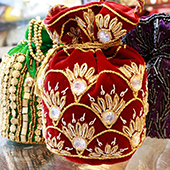Design Resource
Zari Zardozi Embroidery - Bhopal, Madhya Pradesh
Zardozi - A Style of Embroidery
by
Prof. Bibhudutta Baral and Manasa K. H.
The richest embroidery in India is the Zari and the zardozi, which is known since the late 16th century. This art form was introduced in India by the Mughal invaders. Zari zardozi is a form of embroidery, which came to India from Persia. Its literal translation, Zar means gold and Dozi means embroidery. Zari zardozi embroidery undergoes the process of using metallic-bound threads to sew on the various products. This skill of embroidering practiced by artisans of early days has passed on this trade among their families and local communities. The Muslim communities residing in India initially executed Zardozi's work. These Zardozi designs vary from place to place.
The states of India, which are involved in the making of zardozi works, are Lucknow of Uttar Pradesh, Gujarat, Ujjain of Madhya Pradesh etc. To date, there are numerous micro-enterprises that specialize in Zardozi. It is particularly popular in countries like Iran, Pakistan and India. The Bhopal city of Madhya Pradesh is also one of the places where the traditional way of zardozi is still practiced. This place has great historical experiences, which have their impression on the art and culture of the place. Bhopal has its own unique art and culture with a rich heritage.
Zardozi is a style of embroidery, which has been in India since the time of Ramayana, Mahabharata. The Actual original process of Zardozi is known as ‘Kalabatun’. Real gold and silver wires were used enclosed along with the silk threads to decorate satin and velvet fabrics. Along with the threads, other rich add-ons such as sequins, beads, precious and semi-precious stones and pearls were also sewn on. These kinds of embroidered works were used in the Mughal Era by the royalty to adorn tent walls in the form of tapestries and wall hangings, as well as on accessories for elephants and horses.
Artisan Mr Javedh Ali is from Bhopal, who got this unique skill from a Person from Rehti village who had come to Bhopal to teach zari zardozi work. He is practicing this work for the past 25 - 30 years. They get orders from local showrooms in Bhopal, based on the client's requirement they design the fabric and send it to the shop for the final finishing work.










